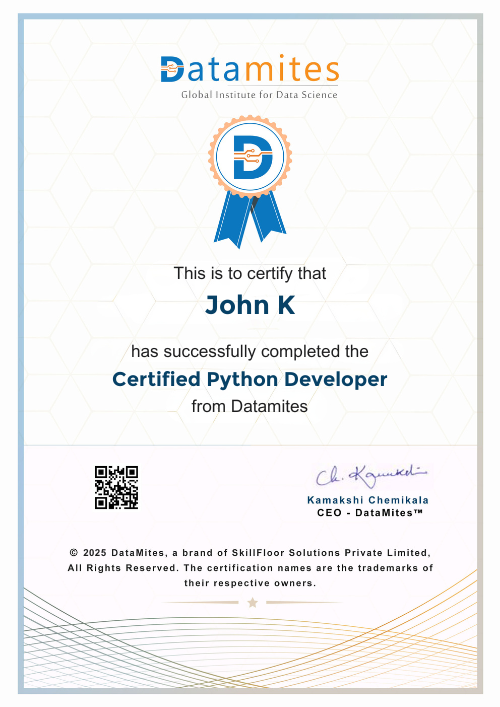Instructor Led Live Online
Self Learning + Live Mentoring
Customize Your Training

• Introduction of python
• Installation of Python and IDE
• Python Variables
• Python basic data types
• Number & Booleans, strings
• Arithmetic Operators
• Comparison Operators
• Assignment Operators
• IF Conditional statement
• IF-ELSE
• NESTED IF
• Python Loops basics
• WHILE Statement
• FOR statements
• BREAK and CONTINUE statements
• Basic data structure in python
• Basics of List
• List: Object, methods
• Tuple: Object, methods
• Sets: Object, methods
• Dictionary: Object, methods
• Functions basics
• Function Parameter passing
• Lambda functions
• Map, reduce, filter functions
• Decorators
• Generators
• Context Managers
• Metaclasses
• Inheritance and Polymorphism
• Encapsulation and Abstraction
• Class methods and static methods
• Special (magic/dunder) methods
• Property decorators - getters, setters, and deletes
• Working with files
• Reading and writing files
• Buffered read and write
• Other file methods
• Logging & Debugger
• Modules and import statements
• SQL Basics
• Creating DB Table
• INSERT, READ, UPDATE, DELETE
• Introduction to MongoDB
• CRUD operations in MongoDB
• namedtuple(), deque, ChainMap,
• Counter, OrderedDict, defaultdict,
• UserDict, UserList, UserString
• Exceptions handling with try-except
• Custom exception handling
• List of general use exception
• Best practice exception handling
• Generators, Iterators
• The Functions any and all
• With Statement
• Data Compression
• A Daytime Server
• Clients and Servers
• The Client and Server Programs
• Classes and Threads
• Multi-threading; thread life cycle
• Regular Expression Syntax
• Group, Split and wildcards
• Quantifiers
• Match, Search and Find all methods
• Character Sequence
• Introduction to OpenCV, Installation
• Basic Operations on Images
• Image Filtering
• Image Classification
• Introduction to GIT
• Basic Git commands
• Introduction to Flask and Installation
• Creating project
• Routing,templates, forms and database integration
• Deployment on render
• Django Introduction and Installation
• Creating a Project
• Django Architecture and File Structure
• Folder Structure, First Django project
• Database and Views, Static Files and Forms
• URL Mapping and Routing
• Defining Models and Relationships
• Database Migrations and Schema Changes
• Querying Data using Django ORM
• Model Forms and Form Validation
• HTML Forms in Django
• Model Forms and Form Validation
• Formsets and Inline Formsets
• File Uploads and Validation
• Deploying Django Applications
• Hosting Options (e.g., Heroku, AWS)
• Project Showcasing and Review
Python is a high-level programming language known for its simplicity and versatility.
Python can be installed by downloading the installer from the official Python website and following the installation instructions.
Favorability depends on context; Python is favoured for its simplicity and ease of learning, while Java is favoured for its performance and scalability in enterprise applications.
Python 2 has reached end-of-life and is no longer maintained, while Python 3 is actively developed and supported, with significant improvements in syntax and features.
Effective methods for beginners include online tutorials, interactive coding platforms, reading books, and participating in coding communities.
Python is effectively utilized in data science through libraries like Pandas, NumPy, and scikit-learn for data manipulation, analysis, and machine learning tasks.
Python frameworks provide pre-written code and libraries to simplify development tasks in specific domains, such as web development (e.g., Django, Flask) or GUI applications (e.g., Tkinter).
Strategies for debugging Python code include using print statements, employing debugging tools like PDB or IDE debuggers, and systematically analyzing error messages.
Python is more general-purpose and has a broader range of applications, while R is more specialized for statistical analysis and has richer packages for that purpose.
The demand for Python developers in Serbia has been steadily increasing, driven by the growing popularity of Python for web development, data science, and automation tasks.
Employers seek Python developers with strong proficiency in core Python concepts, problem-solving skills, experience with frameworks/libraries, and the ability to write efficient, maintainable code.
Python certifications can enhance one's career prospects by validating skills, but practical experience and projects often carry more weight in the eyes of employers.
Craft a compelling resume by highlighting relevant Python projects, showcasing problem-solving abilities, and emphasizing specific technical skills and achievements.
Prepare for Python developer interviews by reviewing common algorithms, data structures, practicing coding challenges, and demonstrating a clear understanding of Python concepts and best practices.
A formal degree is not always required for a career in Python development, as practical skills and experience can often outweigh academic qualifications.
The primary duties of a Python developer include developing applications, implementing algorithms, troubleshooting issues, and collaborating with team members.
Transition into a Python developer role by acquiring relevant skills through online courses, bootcamps, or self-study, building a portfolio of projects, and networking with professionals in the field.
Python is extensively used in data science for tasks such as data manipulation, analysis, visualization, machine learning, and statistical modeling.
Python is utilized in artificial intelligence for tasks such as natural language processing, computer vision, machine learning algorithms, and neural network development.
Companies like Google, Facebook, Amazon, and Netflix extensively utilize Python in their operations for various purposes including web development, data analysis, automation, and machine learning.
The Python Developer's salary in Serbia ranges from RSD 1,80,000 per year according to a Glassdoor report.
DataMites comes highly recommended for Python training in Serbia because of its thorough curriculum, experienced instructors, and flexible teaching methods. With a focus on practical learning through hands-on projects and dedicated placement support, DataMites is an ideal option for those seeking to improve their Python proficiency and career prospects.
Consider enrolling in DataMites' Python Training in Serbia to master a widely-used programming language and boost your career prospects. The program provides practical, hands-on learning and a curriculum tailored to industry needs.
The Python training in Serbia spans four months and comprises 20 hours of live online sessions, supplemented by 400 hours of self-paced learning.
DataMites offers Python developer training in Serbia suitable for individuals from diverse educational backgrounds, such as graduates, postgraduates, and high school graduates. Tailored for beginners, the program prioritizes building a solid understanding of Python's fundamental principles.
DataMites offers a Flexi-Pass alternative for Python training, granting individuals a three-month window to access training sessions. This flexibility enables participants to address queries, revise material, and attend extra sessions as necessary to fulfil their individual needs.
The DataMites Certified Python Developer course offers thorough Python training, covering basic to advanced topics, to equip learners with advanced Python skills.
The Python for Data Science course caters to individuals with varying levels of programming proficiency, covering fundamentals such as data importing and manipulation, coding machine learning algorithms, and essential programming techniques, regardless of prior experience.
The Python for Machine Learning Course in Serbia offered by DataMites provides a thorough introduction to Python tailored for machine learning applications. It covers the basics of the language and demonstrates how they are applied in machine-learning contexts. Participants delve into a variety of machine learning algorithms, examining both their theoretical underpinnings and how to implement them in practice. Through hands-on coding exercises, attendees learn to harness the power of Python, particularly utilizing the Scikit-Learn package, to create resilient machine-learning applications.
Deep Learning with Python Course offers an introduction to deep learning utilizing the Python language and the robust Keras library. Participants delve into both theoretical concepts and practical applications, including computer vision, natural language processing, and generative models.
At DataMites, the Python training fees in Serbia range from RSD 18,683 to RSD 47,207.
Certainly, DataMites offers Python courses in Serbia along with internship opportunities. Participants are provided with the chance to intern at an AI company, where they can acquire invaluable real-world experience and apply their Python skills in professional environments. This experience enhances their employability and prepares them for the industry by providing practical exposure.
DataMites provides the esteemed IABAC® certification for Python, renowned worldwide for validating proficiency in the language. Earning this certification demonstrates one's expertise and knowledge in Python programming, offering global acknowledgement of their skills.
Certainly, candidates are required to bring valid photo identification, such as a National ID card or driver's license, to the training session as a prerequisite.
Absolutely, as part of its Python Training in Serbia, DataMites provides project opportunities. Participants engage in 10 capstone projects and 1 client project, offering them practical experience and chances to utilize their Python skills in real-world contexts. This hands-on approach enriches their learning journey and improves their employability.
If a participant in the Python training in Serbia misses a class, they can conveniently access recorded sessions and course materials via DataMites' online learning platform. Furthermore, they have the option to seek assistance from instructors and arrange makeup sessions to prevent any setbacks in their learning progress.
The tools covered at DataMites for Python developer training in Serbia are- Anaconda, Python, PyCharm, Flask, NumPy, Pandas and Google Colab
Absolutely, you will receive a complimentary demo class offering insights into the training and a preview of what to anticipate throughout the course.
The DataMites Placement Assistance Team (PAT) hosts career mentoring sessions to help aspirants understand their role in the corporate world. Industry experts guide students on career possibilities in Data Science, addressing challenges newcomers may encounter and offering strategies to overcome them.
Certainly, DataMites provides the chance for a demo class before enrolling in Python Training in Serbia. This enables potential participants to get a firsthand experience of the teaching approach, engage with instructors, and evaluate the course content to ensure it meets their learning goals and expectations.
Various payment options are accepted for DataMites Python training in Serbia, including cash, credit card (Visa, Mastercard, American Express), net banking, check, debit card, and PayPal.
The DataMites Placement Assistance Team(PAT) facilitates the aspirants in taking all the necessary steps in starting their career in Data Science. Some of the services provided by PAT are: -
The DataMites Placement Assistance Team(PAT) conducts sessions on career mentoring for the aspirants with a view of helping them realize the purpose they have to serve when they step into the corporate world. The students are guided by industry experts about the various possibilities in the Data Science career, this will help the aspirants to draw a clear picture of the career options available. Also, they will be made knowledgeable about the various obstacles they are likely to face as a fresher in the field, and how they can tackle.
No, PAT does not promise a job, but it helps the aspirants to build the required potential needed in landing a career. The aspirants can capitalize on the acquired skills, in the long run, to a successful career in Data Science.



